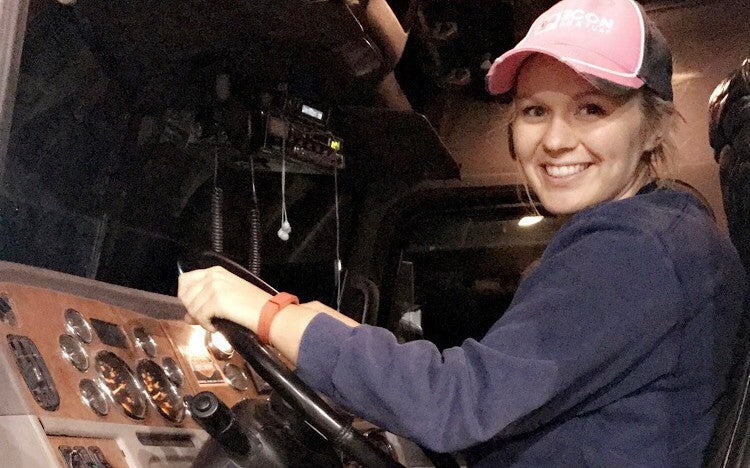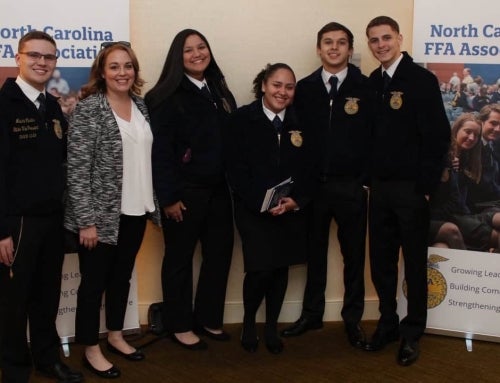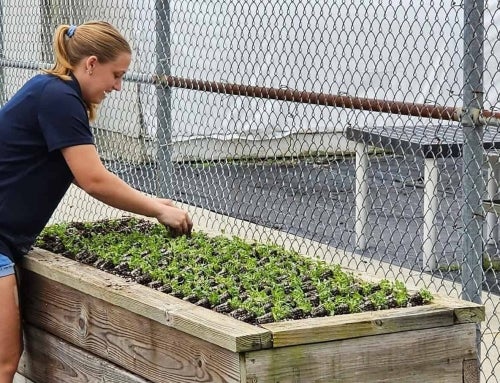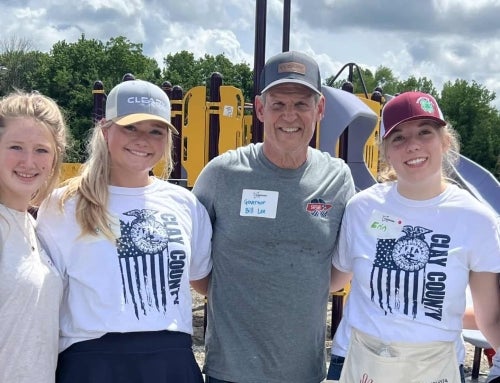Diesel technology and engine mechanics are practically part of Kellie Einck’s DNA. The 23-year-old Iowa resident and South O’Brien FFA alumna grew up watching her family drive, dispatch and pitch in when needed at her granddad’s company, Einck’s Trucking.
“When I was a kid, the highlight of summer was going on the road with Dad for three or four weeks at a time and helping him with mechanical stuff,” she says. “He hauled livestock — hogs, cattle and sheep — for my grandpa. We’d go coast to coast, from Maine to California.”
Einck also recalls riding shotgun on shorter routes throughout the school year.
Hers was a childhood chock-full of “all the typical girlie toys, like Barbies and other dolls.” As an adult, she says it was those treasured trips and family ties to trucking that inspired her lucrative career in diesel mechanics and business management.
“I think it was hanging out with Dad and Grandpa at the truck shop that influenced me most,” she says. “My grandma also drove a truck back then. When Grandpa needed to sleep, she drove the truck to help him out – to keep the family income flowing and to keep the business going.”
In recent years, Einck’s been the woman behind the wheel occasionally. “I do have my CDL [commercial driver’s license], so my dad lets me — makes me — drive once in a while to practice shifting,” she says with a laugh.
Pursuing Her Passion
It was in high school that Einck fully immersed herself in the study of mechanical engineering. Through FFA, she gained even more hands-on experience. By her junior year, Einck enrolled in a concurrent two-year diesel tech program at a local community college. For her SAE requirement, Einck punched the clock as a mechanic and service technician at a small auto garage. Before long, she was working on not only cars and trucks but also tractors, combines and tillage equipment. Her efforts earned her the prestigious 2017 American Star Award in Agricultural Placement.
The only female in her diesel tech classes, Einck knew she was entering a male-dominated industry. More importantly, though, she was heading into a field she genuinely liked.
“Working at something eight hours a day for 60 years is a long time to do something you hate,” she says. “So I went into something I really, really enjoy.”
Einck encourages everyone to pursue his or her passion, regardless of seemingly gendered jobs. “I think you should try out whatever interests you because you don’t know what you don’t know,” she says. “You can’t let society’s norm determine your career.”
Because current mechanical engineering has become so highly technological, she says it requires in-depth knowledge of applied science and software beyond the capabilities of simply wielding a wrench and screwdriver.
“It’s not as much a male-dominated field as it is a smart and hardworking person’s field,” she says. “In the ag or diesel world, everything runs with vast electrical units, controllers and computers. Tractors use satellite applications and software technology, and users need a computer and cell phone to operate them.”
Breakthrough
After receiving both her high school diploma and associate’s degree, Einck wasted no time putting her knowledge (and self) to work. “I was just 18 years old, and I remember walking into the [John Deere] dealership. Here was a shop full of middle-aged mechanics — about 25 of them, all men. They kind of looked at me like I was crazy, and I looked at them like they were scary,” she says. “Now, we’re all good friends and have so much respect for each other.”
Initially, she felt some reluctance from clients who seemed to disapprove of a young, female mechanic.
“When I started my job, there were definitely older farmers who preferred the male mechanics to work on their equipment, because if their tractors didn’t work, it was their livelihood on the line. So they wanted ‘the man to do it,’” Einck says. “They didn’t come right out and say it, but you could tell from their faces that they were uneasy and maybe unhappy.”
She harbored no resentment.
“In a sense, I don’t blame them, because the 60- or 70-year-old farmers are used to the women being in the kitchen or patching their jeans and caring for the kids,” she says. “That’s how it was when they were growing up. If my grandpa were alive, he probably wouldn’t want a girl working on his equipment, either. You just have to be patient with them.”
Attitudes began changing when those farmers retrieved their repaired equipment. “They saw that I could do it just as well as anyone else. They were surprised and grateful, and they came around and were more accepting of the idea.”
Einck went on to work as a mechanic at Agrivision Equipment, a John Deere dealership and service center, and took online classes during nights and weekends to earn a bachelor’s degree in accounting. Now, four years later, she balances budgets instead of tires as a service administrator.












